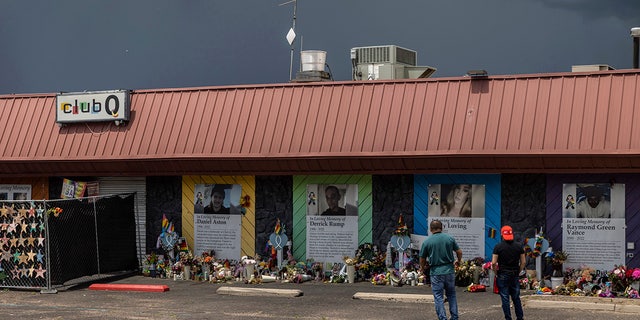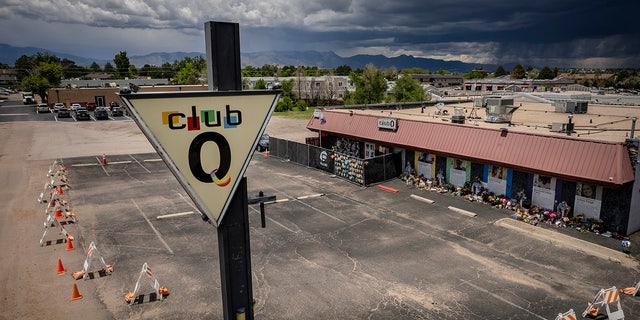Colorado Springs Club Q ‘nonbinary’ shooting suspect pleads guilty to murder charges
Club Q shooting suspect Anderson Lee Aldrich pleaded guilty to murder and attempted murder charges during an arraignment hearing Monday morning, avoiding the prospect of a public trail just seven months after the deadly Colorado attack.
Aldrich, who public defenders have said identifies as nonbinary and prefers to be described using they/them pronouns, is accused of fatally shooting five people and wounding 17 others at the LGBTQ+ nightclub Club Q in Colorado Springs, Colorado, on Nov. 19, 2022.
The suspect, whom the judge referred to as “Mx. Aldrich” during Monday’s arraignment hearing, accepted a plea agreement for a life sentence without the possibility of parole in exchange for pleading guilty to five counts of first-degree murder. Aldrich also pleaded guilty Monday to 46 counts of attempted murder in the first degree.
Much debate has swirled about what motivated the massacre.
COLORADO SPRINGS CLUB Q ‘NONBINARY’ SHOOTING SUSPECT RAN NEO-NAZI SITE, USED GAY SLURS ONLINE, POLICE TESTIFY
The suspect pleaded no contest to felony and misdemeanor charges of biased motivated crimes. “Because of the evidence presented I believe there is a high probability of being convicted at trial to those counts, and so I am pleading no contest or no low contender,” Aldrich told the court Monday, explaining the no contest plea.
In an interview from jail, Aldrich reportedly admitted to The Associated Press to being on a “very large plethora of drugs” and abusing steroids at the time, expressing regret for the attack and adding that suggesting the shooting was motivated by hate was “completely off base.”
In court hearings earlier this year, law enforcement testified that Aldrich ran a neo-Nazi website and used gay and racial slurs while gaming online, while the defense countered that Aldrich’s sometimes abusive mother forced the suspect to frequent LGBTQ+ clubs.
Two veterans out at Club Q reportedly helped thwart the attack by disarming Aldrich, who was beaten by patrons and displayed a bruised and bloodied face in his initial mugshot and court appearance. Aldrich was facing more than 300 state counts, including murder and hate crimes. The Justice Department is also considering pursuing federal hate crime charges, according to a senior law enforcement official who spoke to the AP.

Aldrich allegedly hinted at plans to carry out violent attacks at least a year before the Club Q assault. In June 2021, Aldrich’s grandparents told authorities that they were warned not to stand in the way of a plan to stockpile guns, ammo, body armor and a homemade bomb to become “the next mass killer.” Aldrich was then arrested after a standoff with SWAT officers that was live-streamed on Facebook and the evacuation of 10 nearby homes, telling officers “If they breach, I’m a f—-ing blow it to holy hell!” Aldrich eventually surrendered.
However, the charges against Aldrich were thrown out in July 2022 after Aldrich’s mother and grandparents, the victims in the case, refused to cooperate with prosecutors, evading efforts to serve them with subpoenas to testify, according to court documents unsealed after the shooting. Other relatives told a judge they feared Aldrich would hurt the grandparents if released, painting a picture of an isolated, violent person who did not have a job and was given $30,000 that was spent largely on the purchase of 3D printers to make guns, the records showed.
Aldrich was released from jail then and authorities kept two guns — a ghost gun pistol and an MM15 rifle – seized in the arrest. But there was nothing to stop Aldrich from legally purchasing more firearms, raising questions immediately after the shooting about whether authorities should have sought a red flag order to prevent such purchases.
The El Paso County Sheriff’s Office said it would not have been able to seek a court order stopping Aldrich from buying or possessing guns because the 2021 arrest record was sealed after the charges were dropped. There was no new evidence that they could use to prove that Aldrich posed a threat “in the near future,” the sheriff’s office said.

Investigators later revealed that the two guns Aldrich had during the Club Q attack – the rifle and a handgun – appeared to be ghost guns, or firearms without serial numbers that are homemade and do not require an owner to pass a background check, according to the AP.
Victims’ family members and survivors are expected to speak at Monday’s hearing.
The Associated Press contributed to this report.
Read the full article Here


